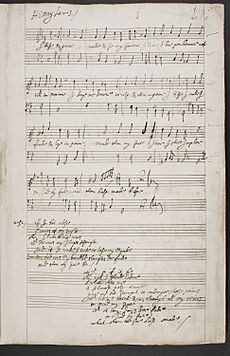Henry Lawes facts for kids
Henry Lawes (born 1596 – died 1662) was a very important English songwriter in the middle of the 1600s. He was also the older brother of another famous composer, William Lawes.
Contents
Life of Henry Lawes
Henry Lawes was born in Dinton, England, around January 1596. His father, Thomas Lawes, was a church musician. Around 1602, his family moved to Salisbury, where his father worked at the cathedral. Henry had three younger brothers, William, Thomas, and John, who were also talented musicians.
Early Career and Royal Service
Henry likely sang in the Salisbury Cathedral choir when he was young. He moved to London around 1615. There, he began teaching music to the daughters of John Egerton, who was a powerful earl.
In 1626, Henry became an "epistoler" and then a "Gentleman" of the Chapel Royal. This meant he was a musician who served the King. By 1631, he was officially one of King Charles I's musicians, playing the lute and singing. He even attended the King's coronation in Scotland in 1633.
Working with John Milton
In the mid-1630s, Henry Lawes worked with the famous poet John Milton. Henry composed songs for Milton's play Arcades. He also helped arrange for Milton to write a special type of play called a masque called Comus. This play was first performed in 1634. Henry often composed music for masques and other royal entertainments during this time. Sometimes, he worked with his brother William and other composers like Simon Ives.
English Civil War and Later Life
The English Civil War (1642–1651) changed Henry's life greatly. His brother William, who fought for the King, was sadly killed in 1645. As a tribute to William, Henry published a collection of psalms (religious songs) in 1648 called Choice Psalms. This book included music by both Henry and William, along with poems and musical tributes from other composers.
During the war, Henry continued to work as a music teacher and performer. He taught music to Lady Mary Dering and often held musical gatherings at his home. He was listed as a music teacher in London in 1651. After the war, musical shows slowly started again. Henry contributed to new entertainments, like those written by William Davenant.
In 1655, Henry published his second book of Ayres and Dialogues. In it, he wrote about how the Civil War had changed his life. He said that even though he had lost his wealth because of his loyalty to King Charles I, he would not "bow for a subsistence to the follies of this age."
Restoration and Final Years
When the monarchy was restored in England in 1660, Henry Lawes got his old jobs back. He became a composer for the King's Private Musick and returned to the Chapel Royal. In 1661, Henry Lawes's anthem Zadok the priest was sung at the coronation of King Charles II.
Henry Lawes died on October 21, 1662. He was buried in the cloisters of Westminster Abbey.
Musical Works
Henry Lawes is best known for his more than 430 songs. These songs helped connect the musical styles of earlier composers like John Dowland to later ones like Henry Purcell. While he wrote some instrumental music, most of it has been lost. His religious music, though some psalm tunes are still used today, is not as popular now.
Many of his songs are still found in old handwritten music books. One important collection, thought to be in his own handwriting, contains 325 songs written between 1620 and 1650. He often set poems by famous writers like Carew, Waller, Herrick, Suckling, and Lovelace to music.
Henry Lawes also published several collections of his songs:
- 1638: Psalms (with words by George Sandys)
- 1648: Choice Psalms (a tribute to his brother William)
- 1653: First Booke of Ayres and Dialogues
- 1655: Second Booke of Ayres and Dialogues
- 1658: Third Booke of Ayres and Dialogues
Many of his songs and short musical pieces (called catches) also appeared in books published by John Playford from 1652 onwards.
See also
 In Spanish: Henry Lawes para niños
In Spanish: Henry Lawes para niños
 | Bessie Coleman |
 | Spann Watson |
 | Jill E. Brown |
 | Sherman W. White |


